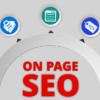With the continuously evolving algorithms of Google, SEO has crossed the realms of being only about keywords. It has become an all-inclusive concept covering various aspects such as user-experience, mobile-compatibility, great content, internal and external linking and a lot more. In this blog, we will focus on the awesome and quick-fix ways to optimize your on-page SEO and maximize your ROI like a pro.
- Determine the keyword you want to gain ranking for
Keywords have been the constant SEO practice that has remained unaffected by the ever-changing Google algorithms. You can use a number of keyword research tools that can help you come up with the right profitable keywords. Identify your target audience first and go for the keywords that you think will be the most searched by them.
- The title tag is important for on-page SEO
One of the key ranking factors that benefit your on-page SEO is the title tag featuring the primary keyword. This way search engines are able to make out what the page is all about; just by looking at the title tag. It should be between 70 to 80 characters long.
- The primary keyword should exist in the URL of the page
This is a very important step to achieve the most out of your on-page SEO. Try to incorporate your primary keyword in the page URL naturally, make sure not to force it into it. A good URL is supposed to be descriptive and should be able to explain what your page contains.
- H1 headings
There should be only one H1 Heading tag on a web page. Make sure to include your primary keyword in your H1 heading as it packs in the much-needed SEO punch. Each page should consist of a unique text as H1 heading. This means that different pages should never comprise of the same H1 heading tag.
- Meta descriptions are a must for better on-page SEO
You find meta descriptions below the title tags on search engine results. Meta descriptions are summarized snippets containing text that describes the content of that particular web page. Sometimes, you may find that certain web pages do not feature meta descriptions. In this case, Google, sometimes, selects a few lines of text from the content of the web page which it thinks describes best what the page is all about. So, pay attention to your meta descriptions as they benefit your on-page SEO to a great extent.
- Relevant content
“Content is king!” We cannot deny this fact at all. Content is the bread and butter of any website. It is known to have the greatest impact when it comes to securing a page-rank in search engines. Long-form content can do you much good. While the exact word-count of long-form content is not fixed, it should be somewhere between 1500 to 2000 words. Longer posts aid in attracting more backlinks than the shorter ones. Content is an important factor that can help you optimize your on-page SEO for an increased ROI.
- Include internal links
All your pages should be inter-linked. This is an excellent practice for the betterment of your on-page SEO. It is a good practice to include your target keyword in the anchor text while you are referring to a particular page. This enables the search engine to have a better understanding of your page content.
With these essential on-page SEO optimization techniques, we are sure you can plan a more strategic SEO campaign. With the right mix of these methods, you are sure to have an amazing online presence and ranking.

Leave a Reply